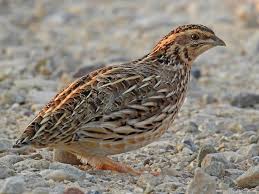
Quails
Conditions of detention
Quails require a secure enclosure or aviary that provides enough space for them to move around, scratch, and forage. Unlike parrots, quails prefer to stay on the ground, so the enclosure should have a solid bottom covered with sand, wood shavings, or straw. It is essential to provide protection from predators and harsh weather conditions.
Useful Fact: Quails are excellent jumpers and can fly short distances, so their enclosure should have a roof or netting to prevent escape. They prefer enclosures with hiding spots like shrubs or small shelters to feel secure.
Nutrition and diet
A balanced diet for quails includes high-quality game bird feed or poultry pellets, supplemented with fresh fruits, vegetables, and occasional protein sources like mealworms. Quails benefit from a diet rich in seeds and grains to mimic their natural foraging behavior.
Useful Fact: Providing a varied diet helps meet their nutritional needs and prevents deficiencies. Quails enjoy foraging for small seeds, so scattering grains in their enclosure can encourage natural behavior.
Health
Quails are generally hardy birds but can be prone to certain health issues such as respiratory infections, mites, and nutritional deficiencies. Regular observation and maintaining a clean environment are essential for preventing diseases.
Useful Fact: Monitoring their droppings for changes in color or consistency can provide early indicators of health problems. Quails should be checked regularly for signs of parasites like mites and lice.
Grooming and care
Quails groom themselves through dust bathing, which helps keep their feathers clean and free of parasites. Providing a shallow dish with sand or fine dirt for dust bathing is important for their grooming routine.
Useful Fact: Regularly cleaning the enclosure and replacing bedding helps prevent the spread of parasites and bacteria. Quails appreciate having access to a dust bath at all times.
Education and training
Quails are not typically trained like parrots, but they can become accustomed to their owner’s presence and routines. Handling should be gentle to avoid stress, and it’s best to limit handling to necessary situations to minimize stress.
Useful Fact: Quails are relatively easy to care for and do not require extensive training or interaction. They thrive when provided with a safe and comfortable environment.
Toys and entertainment
Quails enjoy simple enrichment activities that mimic natural behaviors, such as foraging for food. Providing materials for nesting and foraging opportunities can keep them mentally stimulated.
Useful Fact: Quails are curious birds and enjoy exploring their environment. Adding branches, leaves, and small logs can create a more interesting habitat.
Safety
Ensure the living environment is free from hazards such as toxic plants, sharp objects, and predators. The enclosure should be secure with appropriate fencing to prevent escape and protect from predators like cats and foxes.
Useful Fact: Quails are susceptible to stress from sudden movements and loud noises, so placing their enclosure in a calm, quiet area is beneficial.
Accessories
Essential accessories for quails include food and water dispensers, nesting boxes, and materials for dust bathing. Providing shelters or covered areas can give them a sense of security.
Useful Fact: Quails often prefer to lay their eggs in secluded areas, so providing nesting boxes or sheltered corners can encourage egg-laying.
Socialization
Quails are social birds and thrive in groups. They form flocks and communicate with each other through a variety of sounds and calls. Keeping them in groups of at least three to five birds can help prevent loneliness and stress.
Useful Fact: Quails have a pecking order within their flock, so observing their interactions can help ensure they are all getting along. Introducing new birds should be done gradually to minimize aggression.
Travel and Transportation
When transporting quails, use a secure and well-ventilated carrier. Ensure that the carrier is stable and provides enough room for the quails to move without getting injured.
Useful Fact: Quails can become stressed during travel, so minimizing the duration of transport and ensuring a calm environment can help reduce stress.
Behavior and psychology
Quails are ground-dwelling birds with natural behaviors that include foraging, dust bathing, and nesting. Understanding these behaviors is crucial for providing appropriate care.
Useful Fact: Quails are generally calm and non-aggressive, making them suitable for small backyard farms or indoor aviaries. They communicate through soft chirps and whistles.
Legal aspects
In most areas, there are few legal restrictions on keeping quails as pets, but it is important to check local regulations regarding bird ownership and breeding.
Useful Fact: Always ensure compliance with local laws and regulations, especially if you plan to breed quails or sell their eggs.


